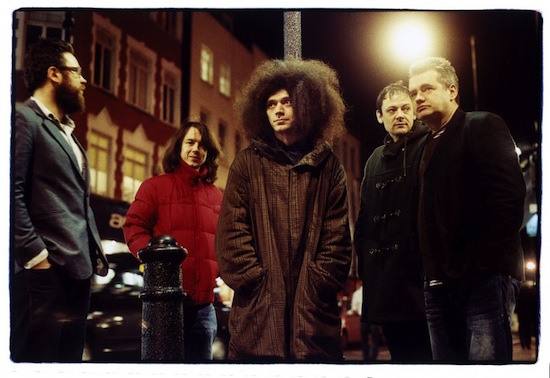…and 2014 got underway with a bang. That starter-pistol blast came courtesy of jazz funk giant Randy Brecker’s The Brecker Brothers Band Reunion, which, loaded with pulse-quickening originals and re-energised classics, seemed to set the pace for the coming year. For some people, January is a time for re-evaluation and soul searching, concepts Brecker clearly got to grips with putting together this project. Following the untimely death in 2007 of his sax-playing brother
Michael, Brecker distanced himself from the pair’s rich back catalogue. That is until he found himself hand picking an outfit for a gig at New York’s Blue Note Jazz Club and realising his band comprised of alumni of different iterations of the Brecker Brothers. Encouraged by producer Jeff Levenson, he decided to bill it as a tribute to his much-missed sibling, which resulted in a studio CD and DVD.
Talking of Blue Note, this year the iconic label celebrates its 75th anniversary. To mark the occasion, the American stable, founded in 1939 and revered for its advancement of hard-bop and deep grooves, not to mention its striking sleeve designs, has teamed up with Soho’s Pizza Express Jazz Club to present the Blue Note Sessions, a monthly series of shows celebrating a classic album from the label’s back catalogue. Quirky London-based quartet Empirical have already given Herbie Hancock’s seminal 1964 album Empyrean Isles a modern spin. Next month, the Liam Noble Trio will be tackling Harlem-born pianist Bud Powell’s The Amazing Bud Powell. Alongside the live engagements, Blue Note will be reissuing a number of iconic titles including trumpeter Lee Morgan’s The Sidewinder and Horace Silver’s Songs For My Father.
Meanwhile, the rest of the year is set to be a veritable marathon of jazz excellence that’ll leave you puffing with glee. By the looks of things, the East London venue XOYO, better known for showcasing hip electronica producers like Fake Blood, is succumbing to jazz’s enchanting power. In the coming months, convention-exploding UK outfits Polar Bear and Get The Blessing and Dagenham-based jazz singer, Zara McFarlane, are set to give the venue’s usual mob of DJs a run for their money. Whether or not the venue is transforming into a hotbed for cutting-edge jazz artists, however, remains to be seen.
Elsewhere, awesome bookings abound at traditional jazz locales like Ronnie Scott’s Jazz Club. In two weeks, drumming legend Billy Cobham, to whom trip hop maestros Massive Attack owe a huge debt, will be celebrating the 40th anniversary of his iconic Spectrum album with a six-night run of shows (3-8 Feb). Other Ronnie’s bookings to keep tabs on this year include Israeli former Chick Corea double-bassist Avishai Cohen (10-13 Feb), trumpet heavyweight Terence Blanchard (23-24 May) and ‘Breezin’ guitar elder statesman George Benson (18 June). Elsewhere, Dalston’s cosy hideaway The Vortex has some pretty tasty engagements in the offing: three-headed skronk monster Berne, Black and Cline (15 Feb); Anglo-German six piece led by the inimitable Colin Towns, Blue Touch Paper (24 Feb); bonkers Mr.Bungle worshippers Shatner’s Bassoon (3 Mar); legendary Aussie improvisers The Necks (21 Mar); and jazz-classical splicers Fringe Magnetic (17 Mar).
To top that all off, there’s a whole host of potentially incredible albums stuffed in the pipeline from the likes of Pat Metheny’s Unity Band, Nostalgia 77, Snarky Puppy and scandinavian jazz punks Trio
Riot. You lucky, lucky sods.
Slowly Rolling Camera – Slowly Rolling Camera
(Edition)
As the dot-com bubble grew in the late ‘90s, so too did the number of British electronic artists ideal for soundtracking a graphic designer’s cheese-and-wine soiree e.g.Lemon Jelly, Zero 7, Nightmares On Wax, Bonobo, Cinematic Orchestra, Four Tet et al. After this speculative bubble finally burst, a handful of these folk and jazz-inflected ambient beatmakers went on to flourish into the new millennium, transcending the aural wallpaper that bedecked the chill-pads of young, trendy professionals e.g. Four Tet, Bonobo and Cinematic Orchestra. Wales-based electronic jazz combo Slowly Rolling Camera, directed by pianist-composer Dave Stapleton, are cast in the same mould as the latter, all sleek string-section jazz that’d nicely complement the leather interior of a German-assembled sedan. To be sure, this has Top Gear-montage music tread-marked all over it, and as such, lacking the requisite accompanying visuals, tends to melt aimlessly into the background. Although at times getting nowhere fast, thanks to the skillful handling of its dazzling young crew, including Polar Bear saxist Mark Lockheart, the album ultimately gets from A to B smoothly.
Simcock & Golubev – Reverie at Schloss Elmau
(ACT)
Classical comes to Welsh pianist Gwilym Simcock as naturally as jazz. At times, filtered through Simcock’s highly virtuosic prism, it’s almost as if both styles are one and the same. The pianist’s first love was classical (his dad brought him up on Prokofiev and Stravinksy). The spell was broken after he discovered jazz in his teens, dropping the academic intensity of classical-piano schooling to pursue his new calling. But you never forget your first love, and Simcock forever reminisces about his via sophisticated, fluid and rapturous compositions.
In Russian double-bass master Yuri Goloubev, the pianist has truly found a kindred spirit. Though there’s quite some distance between them geographically, they play like they grew up in each other’s pockets. Simcock’s piano work shimmers, expands and flies; Goloubev’s accompaniment is spiked with freshness and grandeur, conjuring the pristine Bavarian pines that engulf their studio at Schloss Elmau. Together, they masterfully extend the album’s title to the music itself, as from start to finish this is a pastoral, contemplative and quietly exhilarating piece of art.
Michael Wollny – Weltentraum
(ACT)
German pianist Michael Wollny is as adept at catching the eye as the ear. His vivid sleeves are often tip-offs as to what to expect from his music . On his latest, Weltentraum (rough translation: ‘dreamworlds’), the envelope-pushing composer stoops behind a mess of blonde locks, like Kurt Cobain once did. The simile is appropriate. Wollny also fuses trio-powered hard-rock muscle with melodic immediacy, as he did on the sit-up-and-listen brilliance of 2012’s Wasted And Wanted. With a new line-up, however, Wollny subdues the bone-crunching rhythms and fiery inventiveness, but the alternative inspirations are never far from the surface.
Weltentraum is a collection of ‘standards’, but of course, Wollny thumbs his nose to songbook traditionalism. Instead, his eclectic assemblage of personal ‘standards’ (tunes that “touched me, that were speaking to me”) is drawn from cinema (David Lynch), philosophy (Nietzsche), comedy (Andy Kaufman), rock (Flaming Lips), pop (P!nk) and romantic classical (Gustav Mahler). You can forget headbanging, this is an album to nod off to (in a brilliant way!) and explore the mysteries of your subconscious.
Polar Bear – In Each and Every One
(Leaf)
Drummer extraordinaire, bandleader and producer Seb Rochford’s storm-like barnet probably stopped growing years ago. Similarly, for a while there, some critics were getting fretful that a lack of ideas had stunted his jazz-punk outfit’s growth. But Polar Bear’s fifth studio album will surely put paid to that notion, as it not only brims with startling invention, but is likely to put them on the map as go-to soundtrackers of urban-life melancholy, alongside the likes of not-so anonymous beat trafficker Burial and Brian Eno-collaborator Jon Hopkins.
Stripping back their bright, funkily hued palette to blacks and greys, Rochford and co. conjure abstract sketches of inner-city malaise, filled with post-industrial scrub, abandoned warehouses and grimy house parties. But with Rochford and electronica wizard Leafcutter John at the rhythmic helm, their arsenal of beats is much more diverse and devastating than the aforementioned producers’ volley of 2-step and techno beats. They trigger violent, clattering pile ups, as on the near-future thump of ‘Chotpot’. Meanwhile, the double-barreled saxist attack of Pete Wareham and Mark Lockheart is a constant reminder that, despite a brief slump, Polar Bear have been one of the most
progressive outfits on the scene in the last decade.
They pull out their Radiohead card on the tribal grind of ‘Malian’, which sounds like Thom Yorke taking an angle grinder to a railway line for ghost trains.
Orchestra Elastique
Cafe Oto, Dalston, Friday January 10
In the same venue last March, London-based improv soundtrackers Orchestra Elastique hammered out an eight-hour marathon of noisy, montage-like spontaneity. In terms of stamina, perhaps only
genre-hopping DJ/producer and tea connoisseur Mr. Scruff could compete with that. But Orchestra Elastique’s exertions are a far cry from Mr. Scruff’s mix-and-match playfulness. Forget Trouser Jazz, theirs is cut from an entirely different cloth. These space-time stretchers work at the intersection where krautrock heads Can, classical, free-jazz and shamanism meet.
Despite their aura of moodiness, this exploratory six piece aren’t adverse to embracing fun. Indeed, their ongoing motif is to face music as a playground. The collective’s avant-garde pleasure park was filled with theremin screams, dizzyingly monotonous beats, delta harp, fizzing electronics, squelching moog, guitar and sliding cello. They probed the rabbit hole all right, but with a sense of childlike
abandon.
Amid the shadows of Cafe Oto, OE jammed for just over an eighth of the time they did last March. Their hour and a half onstage was a whirlwind of droning minimalism and amorphous psychedelia which swept us across not only continents (middle east, south America), but time periods (1970s, 19th Century romanticism). In the eye of the storm, like oblivious children engaged in solitary play, each member toyed with their instrument as if in a separate universe to the rest, ostensibly unaware of the cacophony they were conjuring. Below the surface however a frighteningly well-attuned mind-link was at work, especially between drummer Tristan Shorr and synth/theremin manipulator Nahum Mantra, from which an unsettling repeat groove of beautiful chaos and grainy decay sprang.




